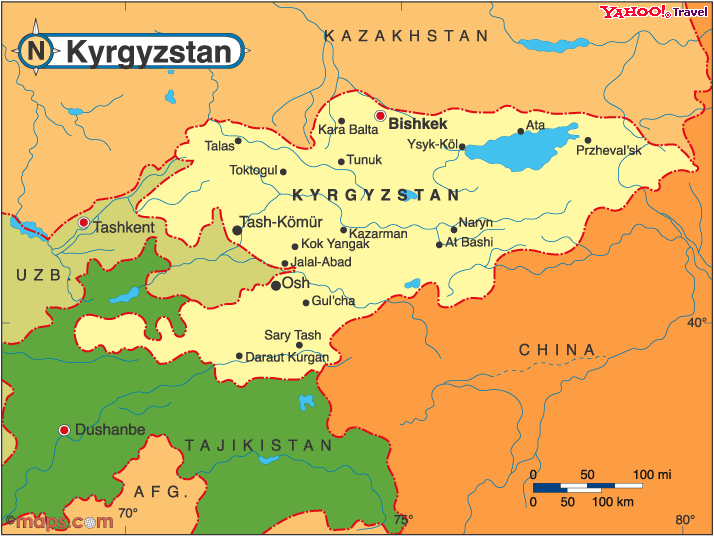
The storm approaches.
My last full day at Song Kul was Eid, the last day of Ramadan. Eid is celebrated in
It’s all so simple now and it was all so confusing at the time. I did not quite get the whole “we are going to eat dinner on 6 different occasions back to back until the 5th house. At each house we would sit, the hosts would graciously offer me the seat of honor, or the seat next to the seat of honor, and then I was encourage by all 10-12 people in attendance to eat, eat, eat. Unlike the two previous feasts I had attended, this one did not feature any vodka. After each sitting, before moving on to the next residence, we prayed Usually one of the tow older men did this, though on one occasion a man of my age recited the verse and did an outstanding job. The verse, as with all verses in the Koran, was in Arabic. When to tow older gentlemen undertook the recitation, it appeared as if they were going through the motions, mumbling Arabic-sounding words in between a few key phrases. The young man clearly had studied, trained and practiced. His Arabic sounded like the genuine article, though my frame of reference is practically non-existent.
On this day, the only day in which everyone I the community needed to walk about outside for longish period (some of the houses were over a kilometer away), winter’s first unquestionable storm raged. The wind blew hard, we had to lean into it to walk effectively. The visibility was about 20ft at times. It must have been really blowing because only about 2-3 inches of snow actually accumulated on the open plains where the families had set up their boz-uii.
The religiosity of the occasion stood in distinct contrast to most of celebrations and customs I took part in at Song Kul. The day I arrived was cold and windy, bouts of chilling rain rolled through now and then. This weather persisted for the next four days, with some variation: sometimes the sun came out but the cold brisk wind remained, sometimes the wind died down but the rain picked up. All of the men worked outside, so this weather was disagreeable (maybe this had something to do with the light work load and constant gaming and drinking). For my host man-figure, the weather rendered his contribution to the home, fishing, unworkable.
So on the fourth day, we had a feast. We went over to a neighbor’s house after breakfast and before lunch. The men had a few shots over conversation about the Kyrgyz contribution to Gengis Khan’s conquests. With a bottle of vodka spent, it was time to move on. The women came out of the boz-uii, we gathered in a semi-circle and my host woman-figure leaned over to me to explain that now we would kill a sheep to make the wind stop blowing. One of the men spoke to us, and perhaps the wind, that this sheep would be killed so that the weather would calm, and everyone could work again. We gave an “Omen.” The Kyrgyz complete a prayer by saying “Omen” and wiping the face with the hands from top to bottom. This is done at the end of every meal.
Two of the men took the sheep into a cooking tent. While everyone else watched they slip its throat, collecting the blood in a plastic dish which would soon contain all of the unwanted bits and organs collected for the dogs. The sheep shuddered some, once the blood had largely drained it twitched a bit, even after the neck was broken. A moment or two after the neck was broken they began cutting into the sheep. The women dripped towards the tent. The men watched and assisted the process when appropriate. A blow torch was used to cook the head, fore-limbs, the liver and some savory bits that served as appetizer for the guys.
On Eid there was no ceremony before preparing the sheep. It was simply waiting for guests when we arrived. Some men had butchered it before the visiting started and the woman of the home saw to the cleaning of the intestines, their stuffing with fat and the boiling of the meat.
Everyone talked and drank tea for quite a long time. The day was rich with conversation as the same 10-12 people gathered at each residence for at least an hour for a meal and just talked and maybe played a little backgammon. We ate and ate and ate some more. The next day I departed back to Bishkek and I couldn’t touch a bite of food until after sunset.

No comments:
Post a Comment